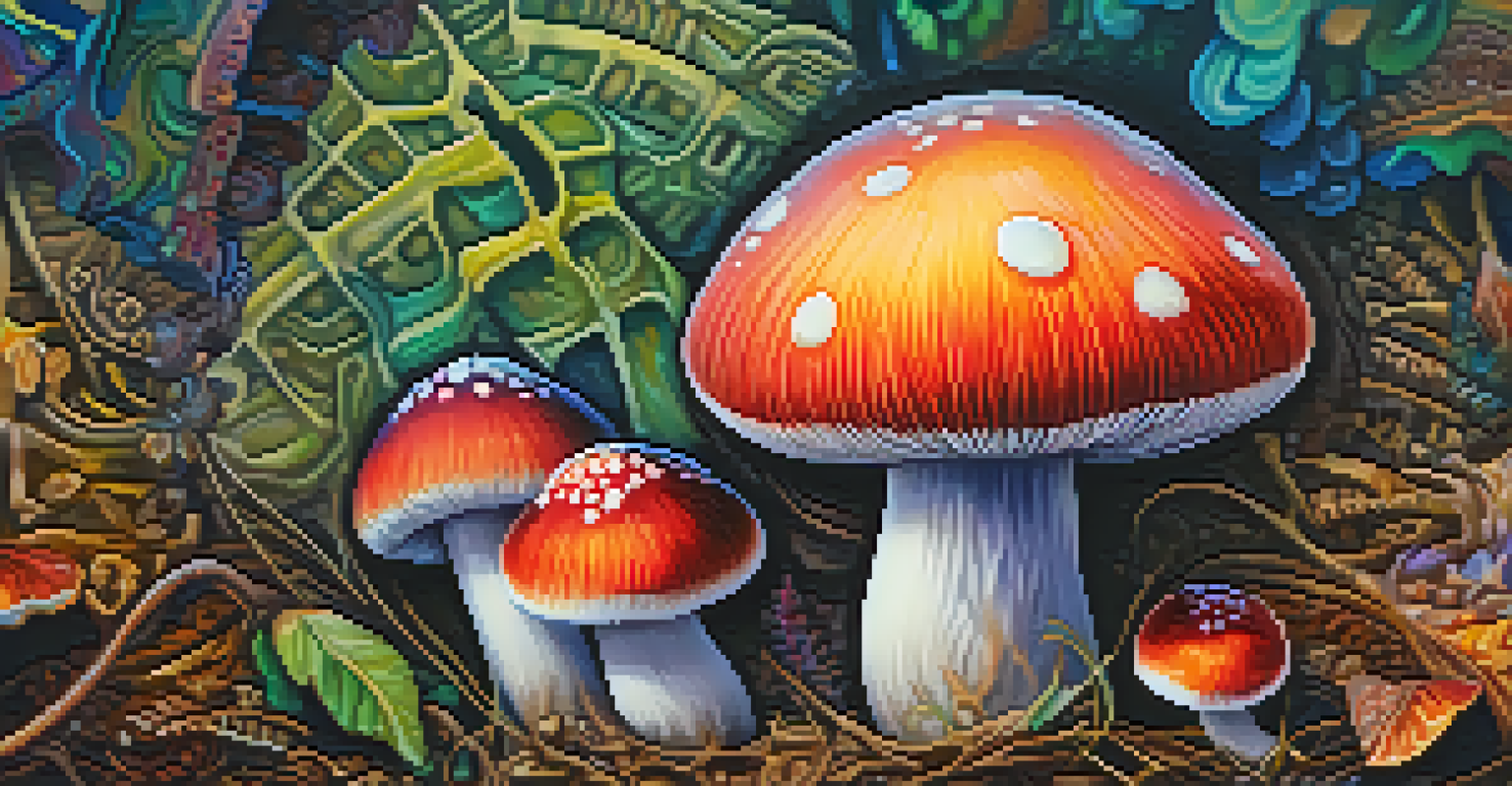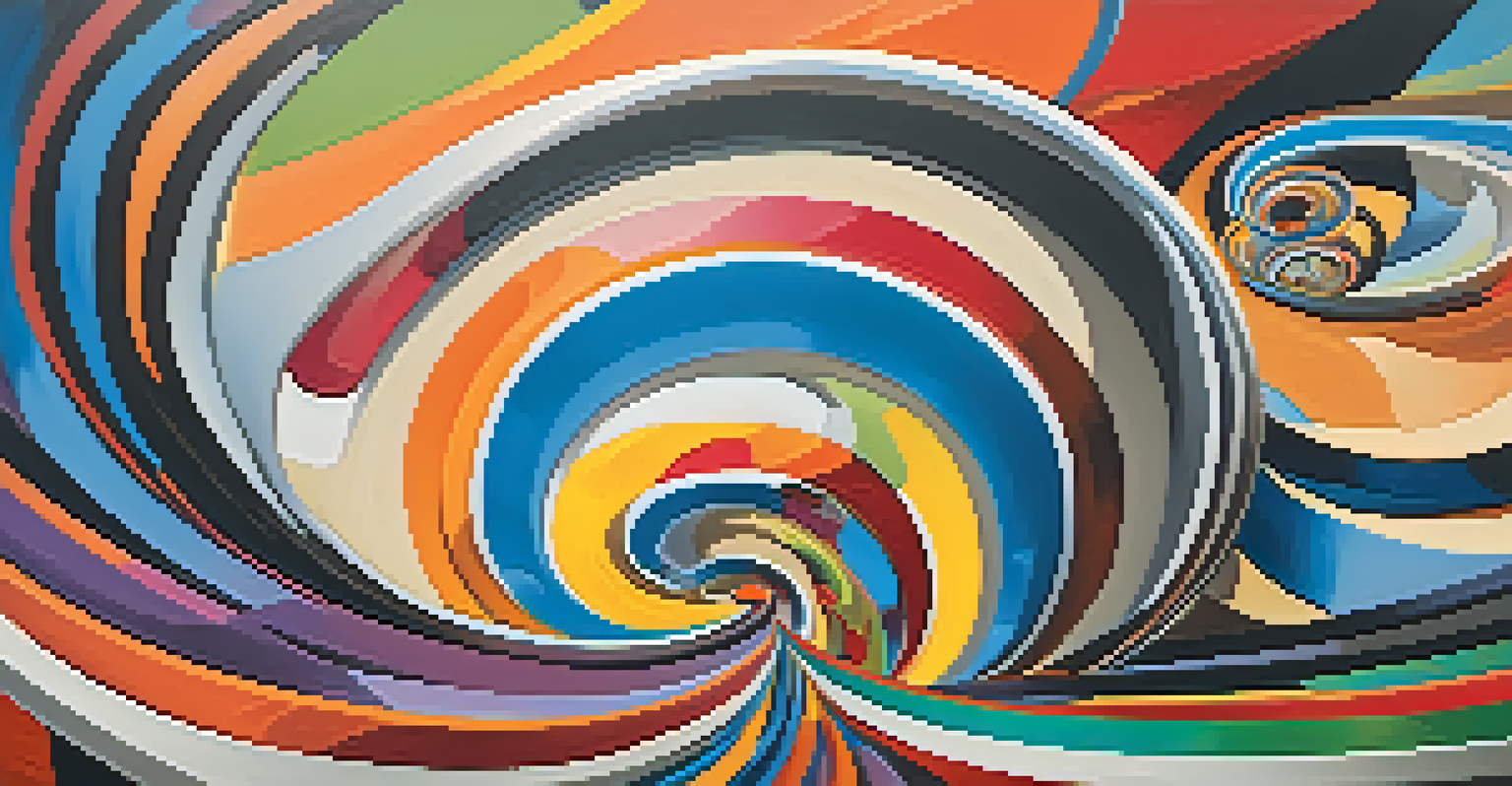Psychedelics and Temporal Distortion: Understanding the Effects

What Are Psychedelics? A Brief Overview
Psychedelics are substances that alter perception, mood, and various cognitive processes. Common examples include LSD, psilocybin (magic mushrooms), and DMT. These substances have been used for centuries in various cultures for spiritual and medicinal purposes. Understanding what psychedelics are is essential to grasping their effects on the mind and body.
Psychedelics can lead to profound insights and shifts in perspective, often altering one's perception of time and self.
When ingested, psychedelics can create profound changes in consciousness, leading to experiences that feel both expansive and deeply personal. They often lead to heightened sensory perception, emotional release, and even mystical experiences. This unique alteration can make time feel fluid and malleable, which brings us to the concept of temporal distortion.
Temporal distortion refers to the subjective experience of time, which can feel stretched, compressed, or even entirely altered. For many users, moments can feel like hours or vice versa. Exploring this phenomenon reveals how psychedelics can reshape our understanding of reality, including the very fabric of time itself.
The Science Behind Temporal Distortion
Research indicates that psychedelics affect brain areas associated with perception and time processing, particularly the prefrontal cortex and the default mode network. These areas play crucial roles in how we perceive time, make decisions, and understand self-identity. When psychedelics alter the functioning of these brain regions, our perception of time can shift dramatically.

One study suggests that psychedelics may enhance neural connectivity, allowing for richer and more complex experiences. This heightened connectivity could lead to a sense of time expansion, where users feel as if they have more time to explore their thoughts and feelings. This is often described as a ‘timeless’ experience, where past, present, and future seem to blend together.
Psychedelics Alter Time Perception
Psychedelics can significantly change how we experience time, often leading to feelings of temporal distortion where time seems to stretch or compress.
However, the experience of temporal distortion isn't uniform; it varies widely from person to person. Some may feel as though time is racing by, while others may find themselves lost in moments that stretch endlessly. This personal variability adds depth to the exploration of how psychedelics influence our perception of time.
Personal Experiences: Temporal Distortion in Action
Many users of psychedelics report profound experiences of temporal distortion, often describing them as life-changing. For instance, someone might describe a trip during which a few minutes felt like an eternity, filled with vivid colors and intricate thoughts. These experiences can lead to deeper insights about oneself and the universe, contributing to personal growth.
The experience of time is a malleable construct, especially under the influence of psychedelics, where the past, present, and future can feel intertwined.
Conversely, some individuals may find the distortion unsettling, especially if they feel trapped in a moment that seems to last indefinitely. This can provoke anxiety or discomfort, reminding us that not all psychedelic experiences are positive. Understanding these varied responses is crucial for anyone considering the use of psychedelics.
These personal narratives serve as valuable anecdotal evidence, illustrating the diverse nature of temporal experiences. They highlight the importance of context, setting, and mindset in shaping how we perceive time under the influence of psychedelics.
Cultural Perspectives on Time and Psychedelics
Throughout history, various cultures have used psychedelics in rituals and spiritual practices, often accompanied by a distinct understanding of time. Indigenous tribes, for example, may view time as cyclical rather than linear, which can influence their experiences with psychedelics. This cultural lens can significantly shape how individuals perceive time during their psychedelic journeys.
In many shamanic traditions, time is thought of as a flexible concept that can be navigated through altered states of consciousness. This perspective can enhance the experience of temporal distortion, allowing participants to explore their past, present, and future in a non-linear fashion. Such rituals often emphasize connection to nature and the universe, further expanding one's understanding of time.
Cultural Views Shape Experiences
Different cultural perspectives on time influence how individuals perceive and process their psychedelic experiences, emphasizing the richness of these journeys.
By examining these cultural attitudes, we can appreciate how context shapes the psychedelic experience. This understanding invites us to reflect on our own perceptions of time and how they may shift when viewed through different lenses.
The Therapeutic Potential of Temporal Distortion
Recent research into psychedelics has highlighted their potential for therapeutic use, particularly for conditions like PTSD, depression, and anxiety. Temporal distortion can play a role in these therapeutic settings by allowing patients to confront trauma from a different perspective. This shift in time perception can create emotional distance, enabling individuals to process painful memories more effectively.
Therapists often guide patients through psychedelic experiences to maximize therapeutic benefits, helping them navigate moments that may feel overwhelming. By recontextualizing traumatic events through altered time perception, patients may find new pathways to healing. This innovative approach is gaining traction in the mental health community.
The therapeutic potential of psychedelics continues to be explored, with ongoing studies examining their efficacy and safety. As we learn more about how these substances influence our perception of time, we may unlock new methods for emotional and psychological healing.
Challenges and Risks of Psychedelic Use
While the potential benefits of psychedelics are compelling, it's essential to recognize the challenges and risks associated with their use. Not everyone will have a positive experience, and some may encounter severe anxiety or paranoia during their trips. Understanding these risks is crucial for those considering psychedelics, particularly in unregulated environments.
The unpredictability of how temporal distortion affects each individual can also be a significant factor. For some, these experiences can lead to confusion or distress, especially if they feel unprepared for the intensity of their journey. This highlights the importance of set (mindset) and setting (environment) when using psychedelics.
Therapeutic Uses for Healing
Temporal distortion induced by psychedelics can provide therapeutic benefits by allowing individuals to confront trauma from a novel perspective.
Moreover, legal and safety considerations must be taken into account. Many psychedelics remain illegal in various parts of the world, limiting access to safe and controlled environments. Awareness of these challenges is vital for fostering responsible use and encouraging informed discussions about psychedelics.
Conclusion: The Interplay of Psychedelics and Time Perception
The relationship between psychedelics and temporal distortion invites us to reconsider our understanding of time itself. By exploring how these substances alter our perception, we gain insights into not only the nature of consciousness but also the potential for healing and personal transformation. This interplay offers a fascinating glimpse into the human experience.
As research continues to unfold, we may find new ways to harness the benefits of psychedelics while mitigating risks. Whether viewed through a scientific lens or a cultural perspective, the effects of psychedelics on time perception are undeniably profound. They challenge us to think differently about our experiences and the passage of time.

Ultimately, the exploration of psychedelics and temporal distortion serves as a reminder of our complex relationship with reality. As we delve deeper into this subject, we can cultivate a greater understanding of ourselves and the world around us, opening up new avenues for exploration and healing.